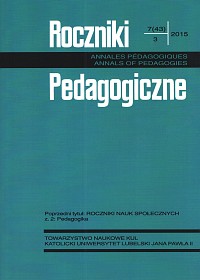Suffering that Perfect, and Leads to Maturity. Part II: Research on Consecrated Men
Main Article Content
Abstract
This article is written consistent with a stream of existential psychology that every person treats individually, each as someone special. You can highlight many aspects of suffering. This article refers to the study of people (men) consecrated, which is particularly important, because in terms of psycho-pedagogical approach it is attempted to show that God is greater than the suffering, and bigger than stereotypes, and that to the consecrated life as diocesan priests or monks are predisposed people who have a vocation, regardless of their background and upbringing. The research shows that suffering in combination with a reference to religious values and the friendly love and love of God has a positive effect on the maturity of the person. Suffering ennobles through love and relationship of the suffering to the maturity depends on the accepted understanding of maturity, because suffering leads to maturity of character and/or emotional maturity and/or maturity of personality. Through empirical studies it was revealed the perfecting impact of psychological distress. It was shown empirically that the consecrated persons who have survived much suffering can be very mature people, understanding themselves and others, are very sensitive, select the value in accordance with the teachings of the Church, have a mature perspective of the impact of suffering on their own lives and deeper self-‑awareness. As a result of the analysis of the research, it turned out, what makes people who were suffering a lot that they are more mature than urgent, is to focus on God, and the meeting in the life pattern friend. This empirical fact confirms the excellent relationship that suffering, combined with a positive attitude towards God, and in combination with the possession of a Friend, refines and leads to maturity. The subjects – people who have suffered showed that the suffering (in conjunction with faith) will cause mature character, at least moderately. Not suffering respondents always have immature character. Maturity character occurs in those who were the most suffering but not always at the same time they have a personality and emotional maturity. The article concludes with a discussion that contains educational message, broadening the conclusions of the study on the educational aspects.
Article Details
References
Frankl, V. (1976a). Homo patiens. Warszawa: Instytut Wydawniczy PAX.
Frankl, V. (1976b). Człowiek wolny. Warszawa: Instytut Wydawniczy PAX.
Frankl, V. (1996a). Man’s Search for Meaning. Washington: Square Press.
Frankl, V. (1996b). Self Transcendence as a Human Phenomenon. Journal of Humanistic Psychology, 2.
Hall, C. S., Lindzey, G. (1998). Teorie osobowości. Warszawa: Wydawnictwo Naukowe PWN.
Jan Paweł II (1984). List apostolski „Salvifici doloris”. Wrocław: Wydawnictwo Wrocławskiej Księgarni Archidiecezjalnej.
Jaspers, K. (1990). Filozofia egzystencji. Warszawa: PIW.
Kornas-Biela D. 2014. Cierpienie rodziny z osobą z niepełnosprawnością. W: J. Kossewska (red.), Osoba ze stanami ze spektrum autyzmu. Możliwości aktywnego życia, (s. 125-145). Kraków: Wydawnictwo JAK.
Maslow, A. H. (1986). W stronę psychologii istnienia. Warszawa: Instytut Wydawniczy PAX.
Maslow, A. H. (1990). Motywacja i osobowość. Warszawa: Instytut Wydawniczy PAX.
May, R. (1989). Psychologia i dylemat ludzki. Warszawa: Instytut Wydawniczy PAX.
Nowakowska, M. (1970). Polska adaptacja 16-czynnikowego kwestionariusza osobowości R. B. Cattella. Psychologia Wychowawcza, 13, 478-500.
Noworol, A. (2010). Cierpienie, które doskonali i prowadzi do dojrzałości. Badanie mężczyzn konsekrowanych. Niepublikowana praca magisterska, Uniwersytet Jagielloński, Kraków.
Noworol A. M. (2014) Cierpienie, które doskonali i prowadzi do dojrzałości. Część I: Rola cierpienia w dążeniu do doskonałości. Roczniki Pedagogiczne, 6 (42), nr 3, s. 129-146.
Pismo Święte Nowego Testamentu i Psalmy (1996). Poznań: Wyd. Pallottinum.
Płużek, Z. (1994). Psychologia pastoralna. Kraków: ITKM.
Polok, G. ks. (2009). Rozwinąć skrzydła. Katowice: KAGA-DRUK.
Sanocki, W. (1986). Kwestionariusz osobowości w psychologii. Warszawa: PWN.
Scheler, M. (1967). Materialne a priori w etyce. „Znak”, 162, 1512-1543.
Scheler, M. (1986). Istota i formy sympatii. Warszawa: PWN.
Siek, S. (1986). Struktura osobowości. Warszawa: ATK.
Szestow, L. (1993). Ateny i Jerozolima. Kraków: Znak.
Św. Teresa od Dzieciątka Jezus (1977). Dzieje duszy. Kraków: Wydawnictwo Karmelitów Bosych.
Uchnast, Z. (1993). Psychologiczna analiza świata-w-którym-żyjemy: Podstawowe założenia psychologii fenomenologiczno-egzystencjalnej. W: A. Gałdowa (red.), Psychologia osobowości i antropologia filozoficzna. Kraków: UJ. Prace Psychologiczne, z. 9.
Żurko, M. (1995). O przydatności metody biograficznej w psychologii. W: M. Straś-Romanowska (red.), Na tropach psychologii jako nauki humanistycznej (s. 98-109). Warszawa: PWN.
